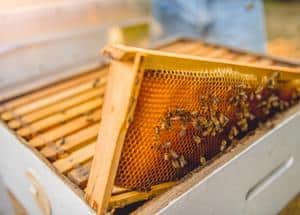We all know that bees are good for the environment, but let’s admit it: it doesn’t make them more welcome in our backyard, not to mention in the kitchen.
This article explores how to keep bees away without going to extremes. Learn how you can stay humane and still expel the striped guests you simply don’t want on your property. A list of natural remedies is included as well as an overview of other popular solutions.
Keeping Bees Away: A Concise Guide
The key to never a bee-free home is to eliminate as many potential bee attractions as possible, including sweet-smelling stuff, confined shady spaces, and open saltwater sources.
To enhance your protection even more, try using humane repellents such as those based on pungent-smelling essential oils like rosemary, cloves, peppermint, citronella, or lemongrass.
Can You Prevent Bees from Entering House Interiors and Patios?
Just like any other animal, beasts come to visit our homes for a reason. What exactly brings them to this or that space might vary depending on a number of factors, such as the type of bees that they belong to (see below if have trouble differentiating between those), time of the year, and the particulars of your property. Identifying the main bee attraction will help you a lot in putting a stop to the invasion.
Like any other living being, the bee is constantly searching for food, water, and shelter. These three constituents of bees’ comfort are also the key reasons why they keep hanging out near or even inside your house as well as hovering over your swimming pool.
When we say food, it includes whatever you prefer to snack on as well as flowers. This is because flowers produce pollen, which is central to the production of honey (bees, in turn, contribute to the environment’s wellbeing by pollinating flowers).
From lavender to crocuses to lilac with a lot in between, plant species that are capable of attracting bees are numerous. That is, the chances that you’ll see some on your territory sooner or later are quite high.
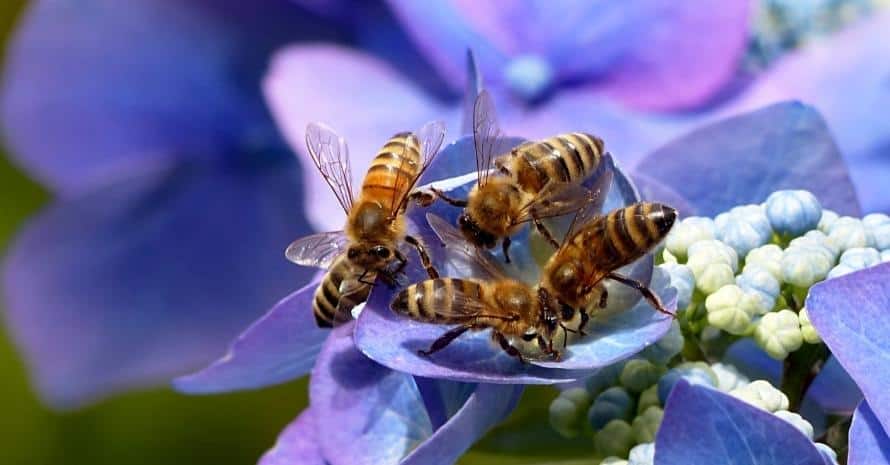
If you live in an area that’s abuzz with bees (pun not intended), you’ll have trouble keeping bee presence at a zero level, especially outdoors.
However, steps like removing potential nesting areas and fragrant things which attract bees will likely help keep it in check. Let’s zoom in on the bee invasion problem to make sure you understand what remedies will work best in your case.
Which Species Are You Dealing With?
This might be new information to you, but not all bees are the same. There are about 20,000 bee species across the globe, of which as many as 4,000 are native to the United States.
Being able to identify what type of bees you are dealing with can help you a lot in warding off the visitors. Probably the most important takeaway should be understanding the probability of aggressive behavior. There are species notorious for their bad temper, while others can be characterized as comparatively meek.
The “Good” Bees
About half an inch long (the queen tends to have a much larger body), honey bees boast yellowish orange and black stripes. They prefer outdoor locations with a lot of flowering plants around but might choose your chimney or a similar nook for nesting purposes during the hot months. Honey bees don’t usually show aggression unless threatened. This is arguably the most common variety.
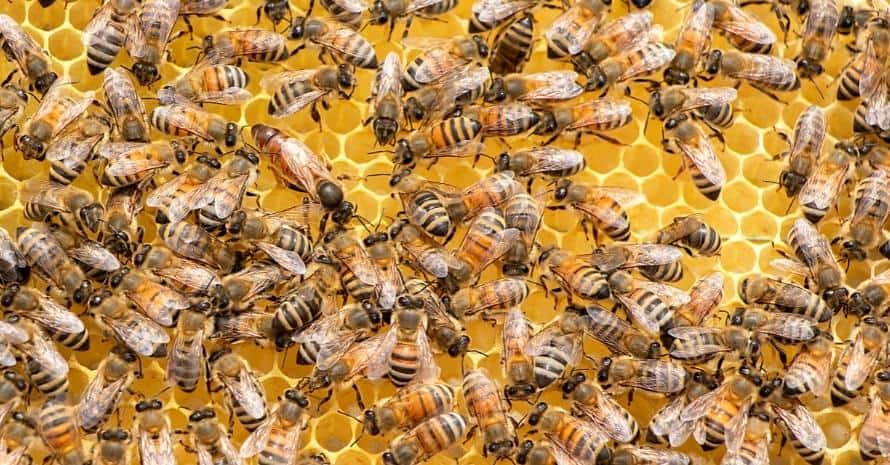
Although a little bigger, carpenter bees aren’t prone to aggression either. Their nests are often found in deckings and other wooden structures as well as trees.
Finally, there are rather languid and unaggressive bumblebees that tend to nest in the ground with occasional cases of finding residence in tall grass.
The Bad Guys
Colloquially known as killer bees, these are probably the most dangerous of all due to their highly aggressive behavior. Their appearance is quite similar to that of honey bees, which makes identification difficult. Notably, Africanized honey bees prefer to arrange hives in the open air.
What Keeps Bees Away from Your House?
The most probable answer to how you keep bees away is by removing everything that could create a welcoming environment for them. Make sure that your home doesn’t have any creaks and corners where the insects could make a nest.
It doesn’t apply when dealing with bumblebees, which are generally harmless, or the much-feared Africanized honey bees as these species don’t typically use man-made structures for nesting purposes. With honey and carpenter bees, however, chances are high that your house needs a good sealing session if you’ve been seeing a lot of striped visitors.
Inspect your house to spot any holes larger than half an inch. One simple way of preventing bees from entering those and using the area inside for nesting is to use a metal screen.
Be prepared in case you see a nest already formed inside a structure. In this case, don’t try to close it off with a screen; the only humane way of getting rid of a bee family that’s already taken residence in your house is to call a professional beekeeper.
When you have made sure there are no major holes or openings, it’s time to take a tour around the house and check for loose siding. Caulk any gaps in it as well as around the foundation.
Next, get rid of any appliances or furniture that you haven’t used in ages as these will likely be full of cozy creaks that attract bees. This, taken together, is how to prevent bees from entering your house.
Repelling Bees Outdoors
Keeping things neat is the answer to how to deter bees from your patio. Large pieces of junk such as an age-old chest of drawers in your backyard are powerful bee attractions, and so are piles of dry leaves, brush, and twigs.
Try to get rid of those before it’s too late and you have a bee nest on your property. This is one case when prevention is way easier than treatment.
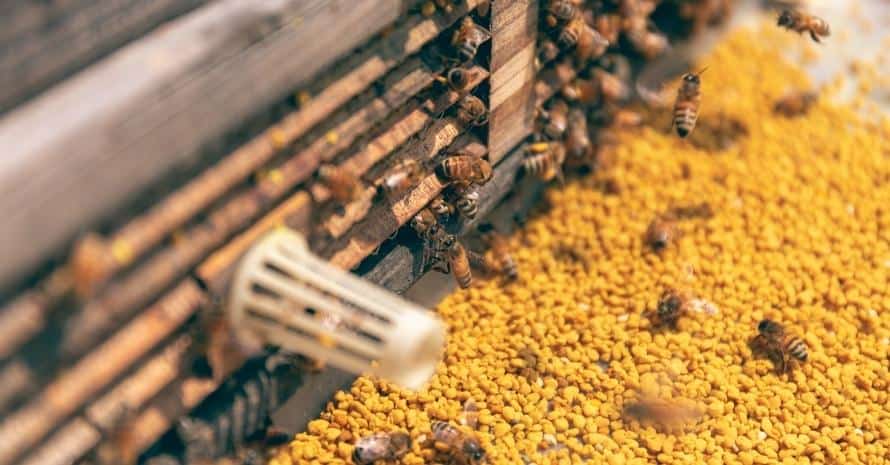
Another element of your patio that is likely to cause an inflow of bees is a pool, especially if it’s a saltwater one. It turns out bees have a strong preference for water that has a high salt content as well as chlorinated water, which often leads them to gather near people’s pools, ruining their summertime parties.
If you don’t always take away leftovers from yesterday’s supper or like to leave an open bottle of juice here and there, this might make matters much worse.
It’s never a bad idea to cover your pool when you are not using it. Also, make sure there aren’t any leaking tubes or joints around. Carry out such inspections on a regular basis to prevent unwanted guests from hovering over the place you expect to give you peace and tranquility.
Additionally, avoid any semblance to flowers as well as having a flower garden that’s too exuberant and too close to areas where you like to hang out. It’s no secret that bees are attracted to flowers.
Unfortunately, they can’t always tell the difference between real and painted ones, so I don’t recommend using furniture with flowery patterns on it on your patio. The same applies to sweet-smelling perfume. Try to avoid it when outdoors during the warmer months of the year, or be prepared to use active defense.
Fragrance at Your Service
Bees have an outstandingly sharp sense of smell, which makes it relatively easy to ward the guests by using pungent-smelling substances. These don’t have to be toxic compounds that will harm the insects as well as the environment.
In fact, there are a number of plants that bees perceive as highly unattractive due to their smell. You can rely on essential oils made from these plants to keep bees at bay on a sunny afternoon.
Cloves are notorious for their pungent smell that deters not only bees but many other insects. Rosemary is another effective bee repellent that can also set a special mood for a while if you mix the oil with water and spray around the areas where bees tend to gather. Other possible essential oils include citronella and lemongrass.
Alternatively, you can plant some peppermint around your house. Bees are typically repelled by its smell, while most humans don’t feel uncomfortable around it.
Keeping It Humane
You might come across tips that suggest you should use insecticide to get rid of bees, but remember: these little striped creatures matter the world to our environment.
Bees are the worlds’ most efficient pollinators, which means they are responsible for preserving a number of plant species that we rely on heavily for food. Believe me, bees are literally worth the buzz, so please stick to the gentler options above.
Bee Removal FAQ
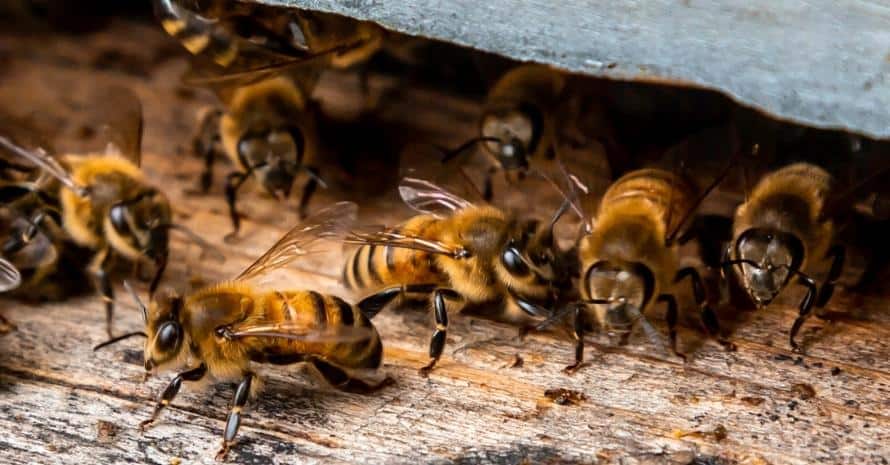
Here’s a little collection of questions that I’ve been asked a lot in the context of fighting off bees’ invasion. These are only answered in a nutshell, so make sure you also check the main body of this article for more details.
What smells do bees hate?
While bees are generally attracted by sweet smells, pungent essential oils such as that of cloves can ward them off for a long time. The list of plants that bees won’t likely put up with is quite long.
Apart from cloves, which produce eugenol, the little stingers are repelled by peppermint, rosemary, cedarwood, a number of citrus fruits, and more. Citronella, which is one of the most common ingredients in plant-based mosquito repellents, can scare away bees as well.
What attracts bees to my house?
Most obviously, bees can’t resist a good honey garden. There’s a wide range of plants that bees find attractive, which means you’ll have to open your doors to these golden-striped visitors if you have those in your patio.
Apart from that, bees will likely hang out next to your picnicking location if you have a habit of leaving sugary foods around. Be prepared to see working bees around if you have a saltwater pool. These insects need water to keep temperature comfortable in their hives, and salty water is their favorite.
Finally, bees tend to look for shelter when swarming, which might well bring them to that cozy nook in your house.
Is there a spray to keep bees away?
Yes, the market is rife with sprays that promise to ward off the unwelcome guests. When it comes to bees, most of these are made with essential oils to avoid harming the bees, which means you can also make your own. Try mixing three parts of water with one part of an essential oil like rosemary or peppermint to keep bees away from your house and/or patio for a while.
The problem with such sprays is that the highly volatile essential oils will evaporate soon. That is, it’s not the most long-lasting solution. Check the sections above for more information on potential alternatives.
Bee-Free Summer? Mission Possible
Bees can get really obnoxious, especially when swarming by your pool on an extra sunny day or interfering with your breakfast of cake and lemonade al fresco. Luckily, there are safe and humane ways in which you can keep them away.
Make sure you don’t showcase bee attractions such as particular plant species next to your home, get rid of welcoming nooks and containers with water. Add a few drops of an essential oil-based spray as needed, and you are good.
Can you think of a time when bees ruined your plans? Let’s share our stories in the comments!
Also read:
- Best Carpenter Bee Trap
- Best Bee Killer Spray
- How to Get Rid of Ground Bees
- How to Keep Bees Away From Pool
- How to Get Rid of Bees in Wall
- How to Keep Bees Away
- How to Get Rid of Carpenter Bees Wd40
- How Do Carpenter Bee Traps Work
References
- Why Honey Bees Need Water and How You Can Provide It (Caitlin Knudsen)
https://www.beepods.com/honey-bees-need-water/ - Attracting Beneficial Bees (Attracting Beneficial Bees)
https://www.gardeners.com/how-to/attracting-beneficial-bees/5024.html - Plant-based insect repellents: a review of their efficacy, development and testing (Marta Ferreira Maia & Sarah J Moore)
https://malariajournal.biomedcentral.com/articles/10.1186/1475-2875-10-S1-S11 - What Smells Do Bees Hate? (Jaco Stander)
https://beekeepingtrove.com/what-smells-do-bees-hate/ - How many species of native bees are in the United States? (U.S. Department of the Interior)
https://www.usgs.gov/faqs/how-many-species-native-bees-are-united-states

